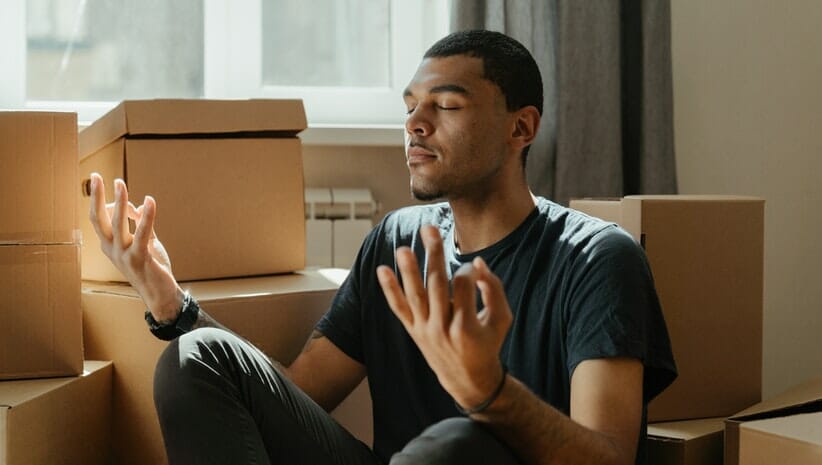
Meditation is a Superpower
Meditation is part of our survival instincts. Meditation is a kind of superpower that nature installed in our bodies. It lets us recover from stress very quickly by relaxing, resting up, and recharging. The actual practices of meditation are totally simple. They basically involve, noticing that you are alive and being grateful for another moment of life. This is an impulse of love and feels like giving in to the deep yearning to let your love flow. You can begin to activate your meditation response just by taking a breath and letting it out slowly. This signals your body to enter a state of relaxation combined with alertness. Meditation is very handy for adapting to challenging situations.
In a physiology lab, meditation looks like the mirror opposite of the stress response. If you measure factors such as metabolic function, blood pressure, heart rate, breathing rate, and muscle tension, stress sends them up and meditation lets them settle down. It makes sense that Nature or the Goddess would give us a “Mantra and chill” response, just bring your own playlist. Of course, Nature, in her genius, would send us forth into this world with a built-in healing and recovery capacity, a magic power we can access whenever we need. If we think a soothing thought, whatever OM is for us, the body mobilizes in the opposite direction than it does in stress. The whole system starts to create relaxation and restfulness.
Selecting the Pathways to Practice
It is like there is a red button and a blue button. If we push the Red button by thinking a scary thought or perceiving something that we interpret as scary, our body mobilizes to deal with the emergency. Our heart starts to race a little, adrenaline and other stress hormones are released into the bloodstream, our digestion slows down, muscles tense up, and all the systems of the body are affected (the cardiovascular, respiratory, endocrine, gastrointestinal, muscular, and reproductive systems). If you push the Blue button by thinking a soothing thought or attending to your senses in a calming way, your body immediately begins to relax.
One remarkable finding from decades of research at Harvard Medical School and other research centers is that when a person meditates in an effortless way, the body enters a state of rest deeper than sleep in about three to five minutes. This profound restfulness is a spontaneous side effect of hanging out with a beautiful thought of your choice. I have spent the last 52 years having an hour or two of this deeply restorative rest every day, and let me tell you, it’s powerful. Knowing that you can just sit down and invoke this kind of a healing state for yourself changes everything. Rest, including sleep, is a way of allowing the body to get busy healing itself. This is why we need to sleep for hours and hours every day. Meditation is similar to sleep, except that we are awake inside.
Benefits of Meditation Include:
- Improved Ability to Focus
- Increased Creativity
- Deeper Level of Relaxation
- Improved Perception and Memory
- Development of Intelligence
- Natural Change in Breathing
- Decrease in Stress Hormones
- Lower Blood Pressure
- Reversal of Aging Process
- Reduced Need for Medical Care
- Reduction in Cholesterol
- Increased Self-Actualization
- Increased Strength of Self-Concept
- Decreased Cigarette, Alcohol, and Drug Abuse
- Increased Productivity
- Improved Relations at Work
- Increased Relaxation and Decreased Stress
- Improved Health and More Positive Health Habits
Meditation, Stress, and Rest
Chronic stress often interferes with our ability to fall asleep and stay asleep. So people can get stuck in a negative cycle – they need rest desperately, but the body-mind system has taken some damage and is not able to access its built-in healing system called sleep. Millions of Americans take some kind of pill to try to fall sleep, and about half of adults say they have trouble falling asleep at least once a week.
One thing wrong with a lot of the thinking about stress, both in science and in meditation gossip circles, is the idea that stress is bad somehow. It’s not. Stress is wonderful. It’s a genius capability that life put into our bodies. You could be deeply asleep and if you smelled smoke and realized there is a fire, you could zoom around like a superhero, gather up the dog or baby or both, and race out of the house.
There are several levels of challenges in meditation.
Meditation is a Key Tool for Survival
Dr. Lorin Roche began practicing with the Vijnana Bhairava Tantra in 1968 as part of scientific research on the physiology of meditation. He has a PhD from the University of California at Irvine, where his research focused on the language meditators generate to describe their inner experiences. He is the author of The Radiance Sutras and Meditation Made Easy. With his wife, Camille Maurine, he wrote Meditation Secrets for Women. A teacher of meditation for 46 years, Lorin’s approach centers on how to customize the practices to suit one’s individual nature. Lorin leads the Radiance Sutras Meditation Teacher Training, a 200 hour certification program registered with Yoga Alliance. Lorin teaches regularly at the Esalen Institute and around the world.
